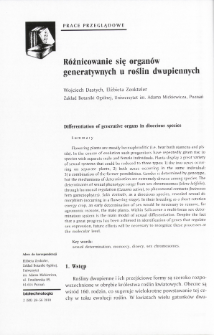- Search in all Repository
- Literature and maps
- Archeology
- Mills database
- Natural sciences
Advanced search
Advanced search
Advanced search
Advanced search
Advanced search

Object
Title: Różnicowanie się organów generatywnych u roślin dwupiennych
Subtitle:
Differentiation of generative organs in dioecious species
Contributor:
Institute of Bioorganic Chemistry PAS ; Committee on Biotechnology PAS
Publisher:
Instytut Chemii Bioorganicznej PAN ; Komitet Biotechnologii PAN
Description:
Abstract:
Flowering plants are mostly hermaphroditic (i.e. bear both stamens and pistils). In the course of evolution such progenitors have repeatedly given rise to species with separate male and female individuals. Plants display a great variety of sexual systems that could be reduced to three types: 1) the two sexes occurring on separate plants; 2) both sexes occurring in the same individual; 3) a combination of the former possibilities. Gender is determined by genotype, but the mechanisms of determination are extremely diverse among species. The determinants of sexual phenotype range from sex chromosomes (Silene latifolia), through hormonal regulation (Cucumis sativa), to pheromonal contacts (between fern gametophytes). Salix viminalis, as a dioecious species, revealed sexual dimorphism (occurring in a flowering stage). In their breeding as a short-rotation energy crop, an early determination of sex would be necessary to remove, for agronomic reasons, the male plants. Within Salicaceae a multi-locus sex determination system is the main model of sexual differentiation. Despite the fact that a great progress has been achieved in identification of genes that regulate sex expression, future efforts will be necessary to recognize these processes at the molecular level.
Relation:
Biotechnologia, vol.89, 2 (2010)-.
Volume:
Issue:
Start page:
End page:
Detailed Resource Type:
Format:
Resource Identifier:
oai:rcin.org.pl:71579 ; IChB B-84
Source:
Biblioteka Instytutu Chemii Bioorganicznej PAN
Language:
Language of abstract:
Temporal coverage:
Rights:
Licencja Creative Commons Uznanie autorstwa-Na tych samych warunkach 4.0
Terms of use:
Digitizing institution:
Instytut Chemii Bioorganiczneji Polskiej Akademii Nauk
Original in:
Instytut Chemii Bioorganiczneji Polskiej Akademii Nauk
Projects co-financed by:
Access:
Object collections:
- Digital Repository of Scientific Institutes > Partners' collections > Institute of Bioorganic Chemistry PAS > Articles
- Digital Repository of Scientific Institutes > Literature > Journals/Articles
Last modified:
Oct 2, 2020
In our library since:
May 27, 2019
Number of object content downloads / hits:
2200
All available object's versions:
https://rcin.org.pl./publication/93823
Show description in RDF format:
Show description in RDFa format:
Show description in OAI-PMH format:
| Edition name | Date |
|---|---|
| Różnicowanie się organów generatywnych u roślin dwupiennych | Oct 2, 2020 |
Objects Similar
Borkowska, Bożenna
Ziółkowski, Piotr Babula- Skowrońska, Danuta Kaczmarek, Małgorzata Cieśla, Agata Sadowski, Jan
Orlikowska, Teresa Sobiczewski, P. Zawadzka, M.
Zenkteler, Elżbieta
Zenkteler, Elżbieta
Nowak, Jacek K.

 INSTYTUT ARCHEOLOGII I ETNOLOGII POLSKIEJ AKADEMII NAUK
INSTYTUT ARCHEOLOGII I ETNOLOGII POLSKIEJ AKADEMII NAUK
 INSTYTUT BADAŃ LITERACKICH POLSKIEJ AKADEMII NAUK
INSTYTUT BADAŃ LITERACKICH POLSKIEJ AKADEMII NAUK
 INSTYTUT BADAWCZY LEŚNICTWA
INSTYTUT BADAWCZY LEŚNICTWA
 INSTYTUT BIOLOGII DOŚWIADCZALNEJ IM. MARCELEGO NENCKIEGO POLSKIEJ AKADEMII NAUK
INSTYTUT BIOLOGII DOŚWIADCZALNEJ IM. MARCELEGO NENCKIEGO POLSKIEJ AKADEMII NAUK
 INSTYTUT BIOLOGII SSAKÓW POLSKIEJ AKADEMII NAUK
INSTYTUT BIOLOGII SSAKÓW POLSKIEJ AKADEMII NAUK
 INSTYTUT CHEMII FIZYCZNEJ PAN
INSTYTUT CHEMII FIZYCZNEJ PAN
 INSTYTUT CHEMII ORGANICZNEJ PAN
INSTYTUT CHEMII ORGANICZNEJ PAN
 INSTYTUT FILOZOFII I SOCJOLOGII PAN
INSTYTUT FILOZOFII I SOCJOLOGII PAN
 INSTYTUT GEOGRAFII I PRZESTRZENNEGO ZAGOSPODAROWANIA PAN
INSTYTUT GEOGRAFII I PRZESTRZENNEGO ZAGOSPODAROWANIA PAN
 INSTYTUT HISTORII im. TADEUSZA MANTEUFFLA POLSKIEJ AKADEMII NAUK
INSTYTUT HISTORII im. TADEUSZA MANTEUFFLA POLSKIEJ AKADEMII NAUK
 INSTYTUT JĘZYKA POLSKIEGO POLSKIEJ AKADEMII NAUK
INSTYTUT JĘZYKA POLSKIEGO POLSKIEJ AKADEMII NAUK
 INSTYTUT MATEMATYCZNY PAN
INSTYTUT MATEMATYCZNY PAN
 INSTYTUT MEDYCYNY DOŚWIADCZALNEJ I KLINICZNEJ IM.MIROSŁAWA MOSSAKOWSKIEGO POLSKIEJ AKADEMII NAUK
INSTYTUT MEDYCYNY DOŚWIADCZALNEJ I KLINICZNEJ IM.MIROSŁAWA MOSSAKOWSKIEGO POLSKIEJ AKADEMII NAUK
 INSTYTUT PODSTAWOWYCH PROBLEMÓW TECHNIKI PAN
INSTYTUT PODSTAWOWYCH PROBLEMÓW TECHNIKI PAN
 INSTYTUT SLAWISTYKI PAN
INSTYTUT SLAWISTYKI PAN
 SIEĆ BADAWCZA ŁUKASIEWICZ - INSTYTUT TECHNOLOGII MATERIAŁÓW ELEKTRONICZNYCH
SIEĆ BADAWCZA ŁUKASIEWICZ - INSTYTUT TECHNOLOGII MATERIAŁÓW ELEKTRONICZNYCH
 MUZEUM I INSTYTUT ZOOLOGII POLSKIEJ AKADEMII NAUK
MUZEUM I INSTYTUT ZOOLOGII POLSKIEJ AKADEMII NAUK
 INSTYTUT BADAŃ SYSTEMOWYCH PAN
INSTYTUT BADAŃ SYSTEMOWYCH PAN
 INSTYTUT BOTANIKI IM. WŁADYSŁAWA SZAFERA POLSKIEJ AKADEMII NAUK
INSTYTUT BOTANIKI IM. WŁADYSŁAWA SZAFERA POLSKIEJ AKADEMII NAUK


































